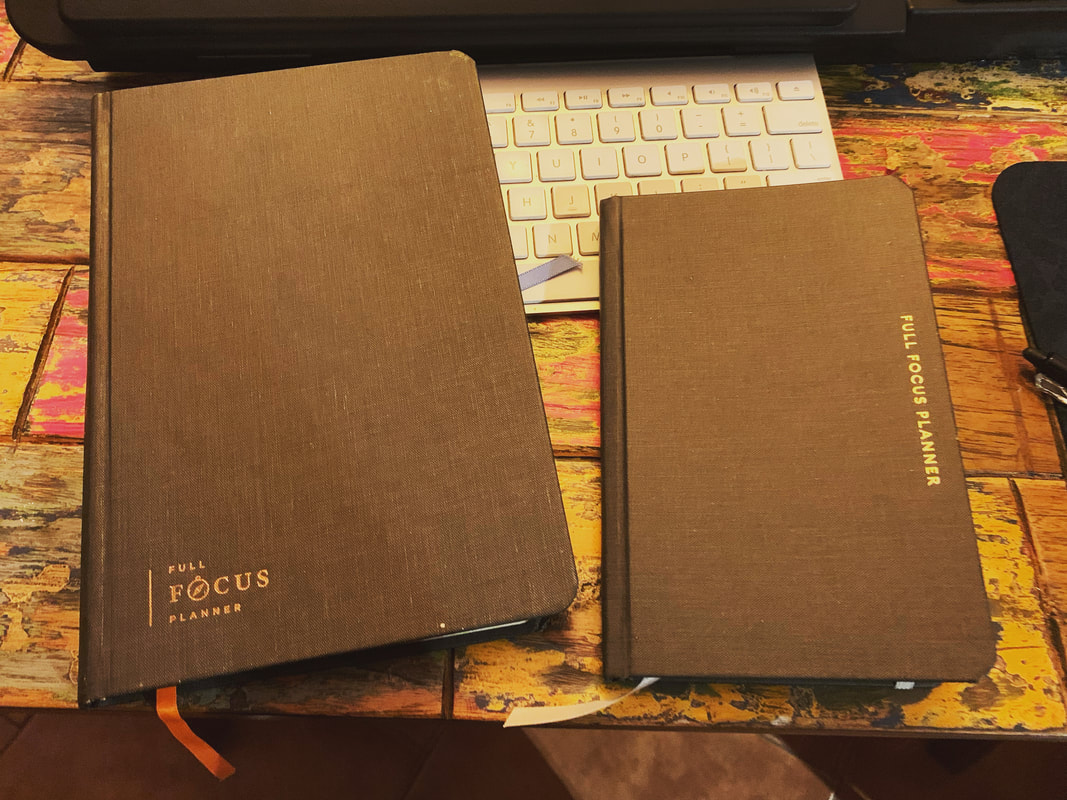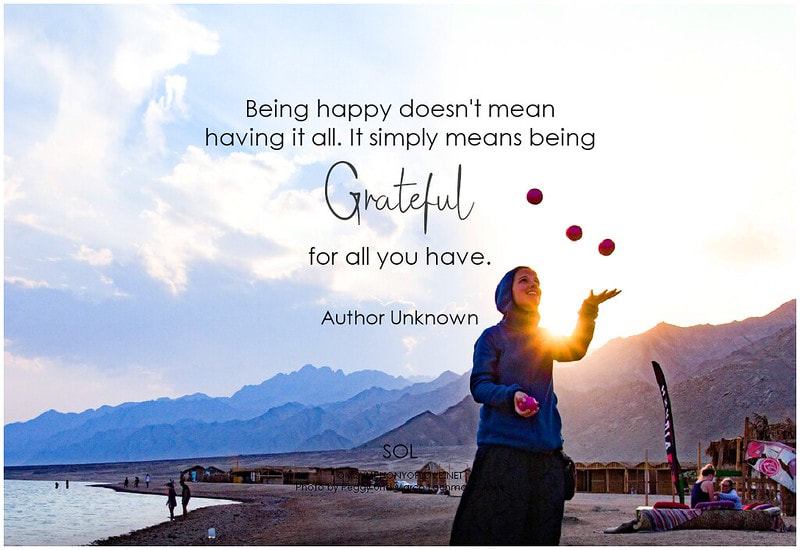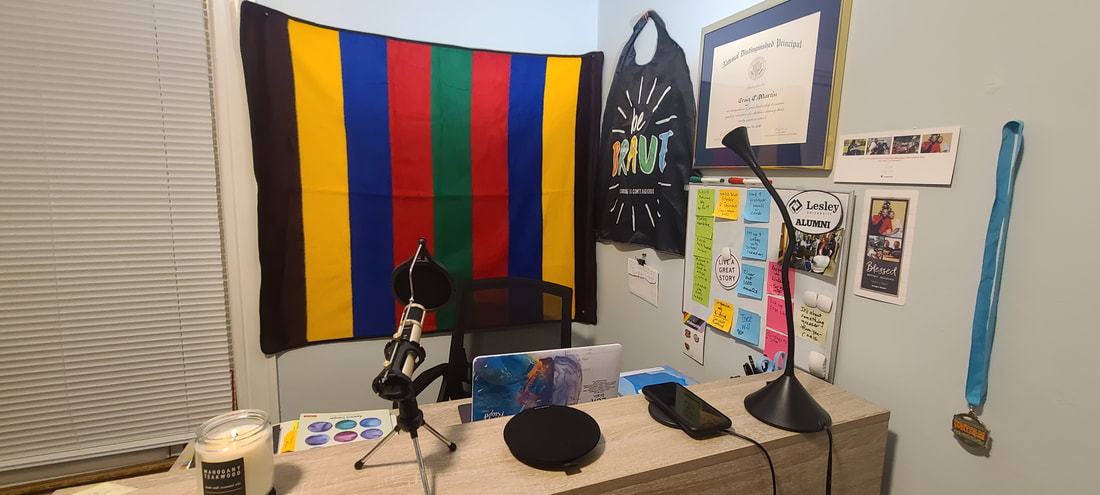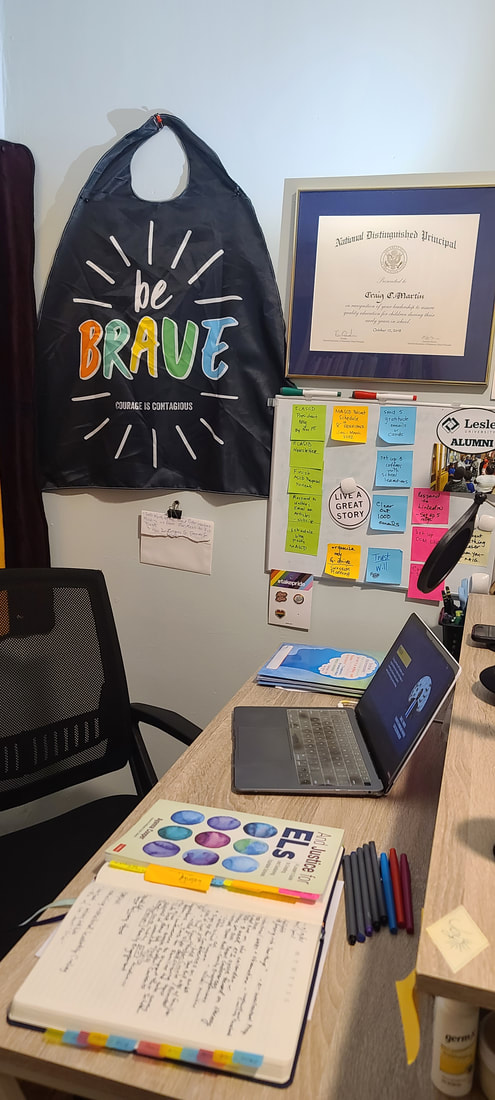|
Christine and I were super excited when Naomi of Growing Minds Consulting asked us to write a guest post for her blog. Naomi's area of expertise is in in UDL in math and we have had some conversations about the cross-over we see in the principles of UDL and minimalism. This piece though, isn't in that lane yet (it's coming, we promise)! This piece showcases three tips that can get you started when adopting what might be a new mindset for you!
"Educators can make up to 1,500 decisions per day. Adopting a minimalist mindset in education means that we are working towards keeping our minds clutter-free. For our minds to remain in optimal problem-solving and decision-making shape, we must have some strategies in place for clearing out what’s irrelevant, to make way for the tasks in our proximal priority zone. If you are someone who can easily and quickly navigate working through a list of tasks, keep tuned into what’s most important at the right times, and maintain a clear line of focus most of the time, you’re already on the right track. If you are someone who needs reminders and a consistent flow of ways to keep yourself sorted out, we’ve got some ideas for you." Click here to read the full post with the three tips on Naomi's site.
0 Comments
2/10/2022 0 Comments Human ConnectionI was a bit reluctant to click on an Uber Business blog post when I was doing a search for the benefits of working in-person versus remote.
I'm happy to report that the first item on their list of why returning to a workplace is important was what I hoped it was... for human connection. But the second point really caught me - optimal workspaces! Hello! Speaking my language! There are studies that show both benefits to going to a workplace and working from home, but I wanted to focus in on the benefits of getting back out into live collaborations as I head into some starting this week. I've spent the good part of this last couple of years in transition between countries, condos, and now home office spaces. I've finally got something set up that I think will help me stay as productive as possible. But... even having our designated workspace at home can mean there are some blurred lines. This week I am looking forward to some in-person work time with teammate, Nicole. We have done all our collaborations online, much like Christine and I as we wrote our book and continue our work together, however this dedicated work time and separate space is going to bring our productivity to a new level, allowing us to reduce a list of items that we kept adding to in a shorter amount of time than when we work online. We've got a lot to do, and I am confident that we will get our work lists sorted out, completed, and still get out to ... goat yoga. 2/3/2022 0 Comments Not all questions300 questions. That’s how many questions a four-year old may ask in a single day according to some studies. How many questions do you think adults ask per day? We can be sure that it’s not 300. It’s not even 100, or 50. Some studies report that adults ask less than 20 questions per day. We can formulate some ideas for why this is.
As we gain knowledge and understanding we may start asking less questions, it would benefit us to start asking more. Here’s why. Good questions can help us clarify our purpose.
Inquiry cycles can help us broaden our perspective.
The right questions can help us move past obstacles.
Spending more time intentionally inquiring about our tasks and challenges would yield more refined and targeted outcomes, allowing us to tackle obstacles and move forward with our individual and communal successes. This is post was originally written for and posted on ResonanceEd.com/blog. To learn more about Resonance Education. Consulting and bringing sustainable social emotional learning systems to your school, click here. 1/25/2022 0 Comments Skill TransferGuest post by Nicole Dissinger We learn so much during our years in school. We learn a variety of concepts from mathematics to writing, visual art, and science. When we think back on all that learning, how much of that has transferred to our everyday lives?
As a teacher I often think, what skills are my students taking with them into their daily lives? Do they use those communication skills we practiced when they are having an issue on the playground? Will they be able to transfer and apply their self-management skills between the science activity into their independent math activities? Over my years of teaching, I’ve developed a clear understanding of the importance of teaching skills. I’ve learned that providing students opportunities to learn and practice skills is more valuable than just teaching them content. Communication, thinking, self-management, social, and research are some of the skills that students wil need tol use when when thinking critically and making decisions in order to solve problems. A common belief arises from both my experience as a teacher and from experiences of other teachers around the world: these skills are essential in students becoming independent and responsible learners. So how do we shift our teaching practice to reflect our beliefs? What do we want our students to be able to do? Simply understand place value and construct a proper sentence? Sure these are important skills, but these aren’t skills that apply to all aspects of their lives. Let’s think bigger. Do we believe that clear communication is important? Do we value clarity in expectations? Do we value using our time and space efficiently? Do we believe that relationships are a priority? If our answers are yes, we need to teach skills that translate from school life to daily life. These values guide the learning and classroom environment and teachers who model these values will see them reflected in their students. 1/19/2022 0 Comments Bookmark BarDo you have your favorite and most used sites saved in your Google search history, on a sheet, or bookmarked on your browser? Me too.
Have you tried to use a OneTab filter system so it looks like there’s only one browser open, but then found your baby (laptop) is running on high because those tabs are still actually running? Me too. What I didn’t realize was that I could have all my most visited sites on my one browser, in plain site, and simplify how my bookmark looks, making it easier to use. As you know, a bookmark bar isn’t the bar you go to to read books and drink a cocktail. It a place our eyes always land when we live in the land of computer work. I can’t take credit for this trick. I did read it in someone’s tech tip blog a few months ago and partially implemented it right after I read it, and then tightened it up in the last couple of weeks. Here’s what I’ve done to simplify what’s on my screen, yet give me the comfort of knowing it’s still there.
As much as I love words, they cluttered up my bookmark bar. We use symbols for a reason, and all the sites I use have recognizable symbols that make it easy to know which site are listed in my bookmark bar. That’s it. It’s an easy to implement system. And one you can tecah your family and students. 1/13/2022 0 Comments My "New" ApproachA new approach can look a lot of things. It depends on what you need, what your vision is, or how you want to feel. For me, it looks like a google sheet. Over this last 12-14 months I’ve made some some attempts to get a handle workflows and projects that have now come to life. I started tracking a few things last spring, and was impressed with myself for sticking by the sheet systems, despite the mess it became by the end of the year. What I decided to do, as always, was lean into my close network. They are awesome to help jog memories of things we’ve chatted about before, but maybe I wasn’t quite ready to dig into. They amazing at sharing ideas, and progress with their use over time. After having a look at some of our emails and texts, I began to do some synthesizing and I came up with what I think will be a sheet system that I can stick with. Here are my two main sheets (with a potential third on the horizon), their tab names, and what’s inside:
Setting these simple trackers up and using them right away, every day, has been helping me keep my thinking organized and ideas in one spot. Like any new habit, it’s taking me some practice and patience to stick to the plan, but I know that because I value flexibility in systems, I can always tweak what needs tweaking. Can’t wait to get this all set up in my reMarkable 2… 1/5/2022 1 Comment Tweaking SystemsEach year, January 1 rolls around, and I know that I will be seeing all these "New Year, New Me" ads and articles popping up. I look at them and may take a peek at what they are about, but I already know I am not making resolutions - again. Making resolutions is a very personal choice that needs to suit you, your lifestyle, and the place you are in at that moment in time. I do like the feel of a fresh start, however, like a new set of Mr. Sketch smelly markers at the start of a new school year. This year I evaluated a few of my systems and a few more of my “systems”, to determine where I needed to make some tweaks. I strongly believe in making changes when something is not efficient or valuable. This year, in the first week of 2022, I decided to make two significant tweaks. Well - one was a tweak and the other is a full system remodel. The first change I made and has already proven to be successful is how I use my phone. No surprise that all my apps live in labeled folders. I knew I needed to do some deleting of unused apps and I also needed to figure out a more efficient way to sort the apps I check most frequently. So on my home screen, I created a folder called "Daily App Check". In that folder I have the 11 apps I check every day. I also put them in order of importance, so when I open that folder, I check my email first, then Voxer messages, and so on, and complete an app sweep in just a few minutes. After a couple hours of working, I will do another app sweep to check messages and socials again. Later in the day, I am not as mindful about the time spent app sweeping because I know I efficiently used my time during the day. The second change I had to tackle was much larger of a brain tickle. I needed to choose how to track my writing. Essentially I needed to streamline a few of my thoughts and documents to get all bits in one place. Thank you Monica, for helping me out with that. We can make changes any time we want, and I am happy with the ones I made this week. I hope the ones you have made have been good choices for you so far. 12/22/2021 0 Comments Adding means subtractingOver the holiday, you may be adding a few things to your shelves, drawers, or countertops. All good! It's fun to give and receive during the holiday season, but because we often add more to our physical spaces during gift-giving season, it may be important to subtract something too.
Let's say you receive a new set of colored pens for your planner. Perhaps you go through your current set of pens to test that they work, toss the ones that don't, and consider if they still suit your needs. If they don't, perhaps you ask your pen-loving friends if they use that type you wish to discard, or send them off to a school for use. Also, I know many of us will be adding books to our shelves this season. As you add those new treasures to your shelves, think about which ones you can trade, consign to the books shop, or donate to a school or library. As you add to your collections, determining what you can subtract helps create a little more physical space, and you will side step having to clear clutter later. 12/9/2021 0 Comments Reflection on the Full FocusI was introduced to the Full Focus Planner in early 2020 by my good friend, Monica Burns of ClassTechTips. I needed something to help me get all my lists, plans, and meeting notes in one place.
I have been using my FFP during goal-reviewing and setting at our quarterly Prime to S.H.I.N.E. meetings with great success. This practice has helped me move forward with several things I was getting stuck in. But.... around the year-mark of using the original FFP, I found I needed to make some changes. I found I wasn't using all the pages I was originally because I had been able to feel some sense of automaticity with some routines - I suppose that means a goal was met! I came to believe that the full Full Focus Planner has had it's place in my life and now I am downsizing to the mini. The mini-planner still has the annual goal setting, goal detail and week-at-a glance, and notes pages at the back of the book. For right now, this feels more streamlined, less chunky, and a better use of pages at this moment in time. I have introduced the small notebooks into my note taking routine because I have several projects that I wanted to keep the note living in their own places. I'm going to try this for a quarter and see how we go. I have since found my Rocketbook, so I may shift again in the spring... we shall see! 11/30/2021 0 Comments EdTech space EssentialsI've had fun this year peeking into spaces, both live and virtually, of some of my dearest friends and esteemed fellow educators and consultants.
This week on her blog, my good friend, Monica Burns of ClassTechTips shared her workspace. Here's how she breaks down her EdTech space:
I love how simple this sounds! Head over to her site to read the details and see the photos. 11/23/2021 0 Comments What Grateful meansIsn't this just so true?
Today Americans celebrate Thanksgiving - the kickoff to the holiday season. A season that can bring up many strong emotions for people. Many of us will experience joy, many will feel sadness and loss, and many many many people will be feeling the stress of entertaining, traveling, cooking and cleaning. This holiday season, find happiness, joy and gratefulness with those you love and care about, first and foremost. Spend time together. Laugh and play games. Eat some pie, sip some wine, and drink lots and lots of coffee. Play outside. Compliment each other. Be present. Do something for someone else. Share your gratitude. And that will bring you happiness. 11/18/2021 0 Comments Chatting with SueThis morning, my co-author and I recorded a podcast episode with her friend and former colleague centered around our book, The Minimalist Teacher. The more we talk to people about this approach, the more realizations I have.
Realizations about... ... the takeaways that readers are experiencing, ... the need for this approach in education, ... and about me. One of Sue's Takeaways: Christine and I intentionally wrote the book so it didn't have to be read as a whole. The intention was for readers to read the chapter(s) that popped out to them, grab nuggets and role with them. In our chat with Sue, it was clear that she gravitated to one chapter in particular - decluttering instructional strategies and assessment. While it was completely satisfying to hear that our intention was achieved, the conversation we had about strategically choosing low-prep yet high leverage instructional practices that cross time, content, and grade level was exactly the thinking we hoped readers would consider and run with. Needed Approach in the Field: The book is called The Minimalist Teacher, yes, but it's written in a way that we hoped would pull in any educator, regardless of role. Our field is a volatile place and we are not seeing much being done to truly support teachers and giving them time and autonomy to focus on teaching, and keeping themselves well. The minimalist movement is about much more than decluttering closets and cupboards. It's a transformative process that can potentially change how educators feel about remaining in the field. About Me: After our last couple of conversations with folks for podcast recordings, I'm realizing more and more how much I really do rely on this way of thinking and living. It's a natural process for me to question and find the purpose of what I'm doing. There are definitely times when I lose site of my purpose and I have to reprioritize, but I am more aware now how helpful this really is. 10/27/2021 0 Comments Five Things a DayThis morning in a team meeting - somehow - we jumped into a short but meaningful chat about "things".
It's not a foreign idea for us to talk about things in our spaces, items we've collected, etc. I always get excited to hear about how people sort and organize their items and collections. But I love even more when people talk about how they up with ways to reduce the amount of things in their spaces. Removing items can make us feel anxious when we think of this potentially time-consuming and emotionally-charged task. I was super excited to hear how a teammate is implementing the "5 things" rule. Each day, she chooses five things to remove from her space - anything - as long as there are five things. She does this is a way to ensure she is successful AND instead of thinking of ALL: the things she wishes she could get rid of - that's too much to think about for anyone! If you're looking for a solid entry point to minimalism at home, in the office, or classroom, this is a great one! You could even remove just ONE thing - it's the perfect starting point if you feel a bit weary about making these changes. And who knows, maybe you will influence someone else to join in the journey with you! 10/21/2021 0 Comments A Dope SpacePeering into people's spaces is something that we have gotten used to over the last year and a half. We have been getting glimpses of people's home lives through our little Zoom boxes, getting to know each other in ways we perhaps had never anticipated.
But what fun this has been - getting to see the design, decor and essentials in people's workspaces! Since a lot of us remain in that virtual world for work, I knew I had to reach out to a few more successful educators so we could find out about the vibe and essentials in those spaces we see so often on our own screens. This week, we are peeking into the DOPE space of Craig Martin, 2018 National Distinguished Principal, otherwise known as - the Principal of DOPE! There are so many amazing things I could share about Craig, but you will easily find some of that out when you read his responses below. Here's what Craig had to say about his home workspace. ME: How do you feel in your space and what makes it feel that way? Craig: I generally feel cozy when I am working in my home office or school office because the elements that are present were specially chosen to add joy to my day. I am 6'3 and it's hard for me to sit and/or stand at anyone's desk these days. As a 20+ year education veteran, I spend most of my days on the move. When I do settle down in my office, I need to enjoy the bliss of a standing desk and a high chair that will allow me to dangle my feet a bit (smile). For me, it is important that my space feels clean, organized, and therapeutic or restorative. It's why I have environmentally-friendly surface cleaners, color-coded storage bins, aromatherapy oils and diffuser, and a comfy lounge chair and coffee table. ME: What are the essentials you keep there? Craig: My workspace essentials are a sound speaker to play music (a little jazz, Broadway, Christian rap, or a good podcast keep me going), aromatherapy (lavender and lemongrass scented oils and mahogany teakwood candles are my faves), a fridge with Gatorade zero or sparkling water, Papermate flair pens, and gum. ME: What plan do you create or action do you take when you get busy and you lose track of your system/order/time to regain the feeling you need in your workspace? Craig: When things get hectic and I find that I am overwhelmed because I am behind on a million action items on my five different organizers (Google Keep, Google Calendar, notebook, whiteboard, and notes app on my phone), I pause, breathe, and clean. I seem to find myself more prepared to take on the world when things are in their rightful places and I see things more clearly (as the song goes...). I find myself creating one whiteboard or anchor chart with all key action items that must be done within a week's time. I hunker down and I begin to plow through the items until I hit benchmarks of 25%, 50%, and 75% of items completed. I never hit 100% done because new things show up every day that restarts a new cycle. My advice to anyone who is reimagining how to make their space more fitting for the busy lives we tend to lead--I would posit that your space must remind you of what is important, inspire you to do better each day, and feel like an old friend you can't wait to spend time with--soon. I love the thought and intention Craig has put into his essentials and space to ensure he can keep his cool, collected self in check, even when the to-do list kicks into high gear. I have a lot to learn from you, my friend! Take a peek at his set-up below! Thank you sharing, Craig! For all Craig's goodness, follow him on Twitter. 9/28/2021 0 Comments TEAMSThis week I've been thinking a lot about what makes teams effective since I just came out of a couple of work related events in which there was brainstorming, listening, collaborating, reflecting, and more.
Yes, I've read articles, blogs, and some video clips over time, but most importantly to me, I have experienced effective teamwork. When I think of the teams I've worked in, they have been pretty diverse. Here are some teams I've worked with throughout my career: - grade teams - magnet leadership team - school leadership team - EdDesign team - conference session planning teams - mentorship planning team - consultant teams You can relate, right? Now... were all these teams as effective and efficient as the previous or next listed? Of course... but they all offered me some sort of learning experience. Here are 5 things I learned working on teams: 1. More people does not equal a better team. 2. Diverse perspectives matter a lot. 3. It is possible that the process or action steps will shift but the goal remains the same. 4. It is hard to maneuver personalities and styles. 5. Teamwork is necessary and a lot of ... fun. Here are 5 things that I know make teams effective and efficient: 1. Having a shared vision, purpose, idea, and/or goal AND routinely check in to ensure you are on track. 2. Finding the right people. People that can feel like a natural fit make it easy to follow the path to meet your goal, but make sure you include people with different views. Think outside the box and zero in on people's natural strengths. 3. Delegating. This is why we have teams! We are not meant to do everything ourselves. Delegating means shorter to-do lists for each member of the team. 4. Trusting each other. Active listening and reflecting together build trust in the process and each other. 5. Keeping things simple and clear. It's easy to get muddled in tasks and creation, but if you keep your goal or purpose aligned with your top priorities, you can stay focused. Simple doesn't mean easy or less thoughtful, it means the opposite. It means you've spent the time to think through your needs and purpose, and the best path to achieve your goal. If you are struggling in a team, think about the above points to see what stands out and ask yourself what it is that doesn't seem right. From there, make a plan to check in with your team. This list is not exhaustive, but it can get you started and help with getting your team on the right track. |
Archives
November 2023
|
Photos from wuestenigel, wuestenigel, wuestenigel, markus119, cowbite, mikecogh, shixart1985, symphony of love, kennethkonica, homegets.com, wuestenigel, quinn.anya, Chuckcars, Dave Hamster, mikecogh, wuestenigel, debaird™, wuestenigel, shixart1985, trekkyandy, frankieleon, Sue90ca MORE OFF THAN ON, WarmSleepy, symphony of love, Marcus Hansson, Cliff Johnson, Leonard J Matthews, Archives Branch, USMC History Division, tmray02, Rawpixel Ltd, joostmarkerink, Andrew Gustar, Thomas James Caldwell, Dano









